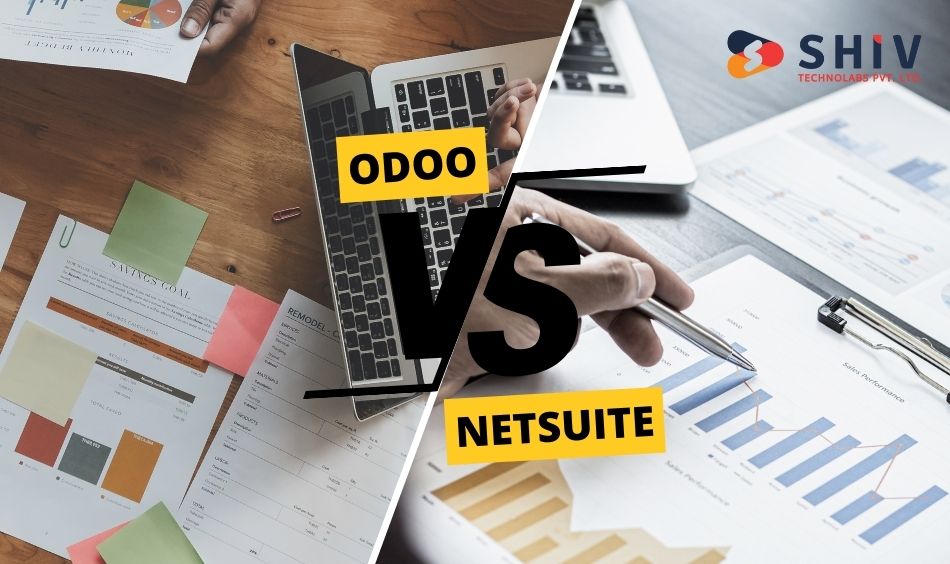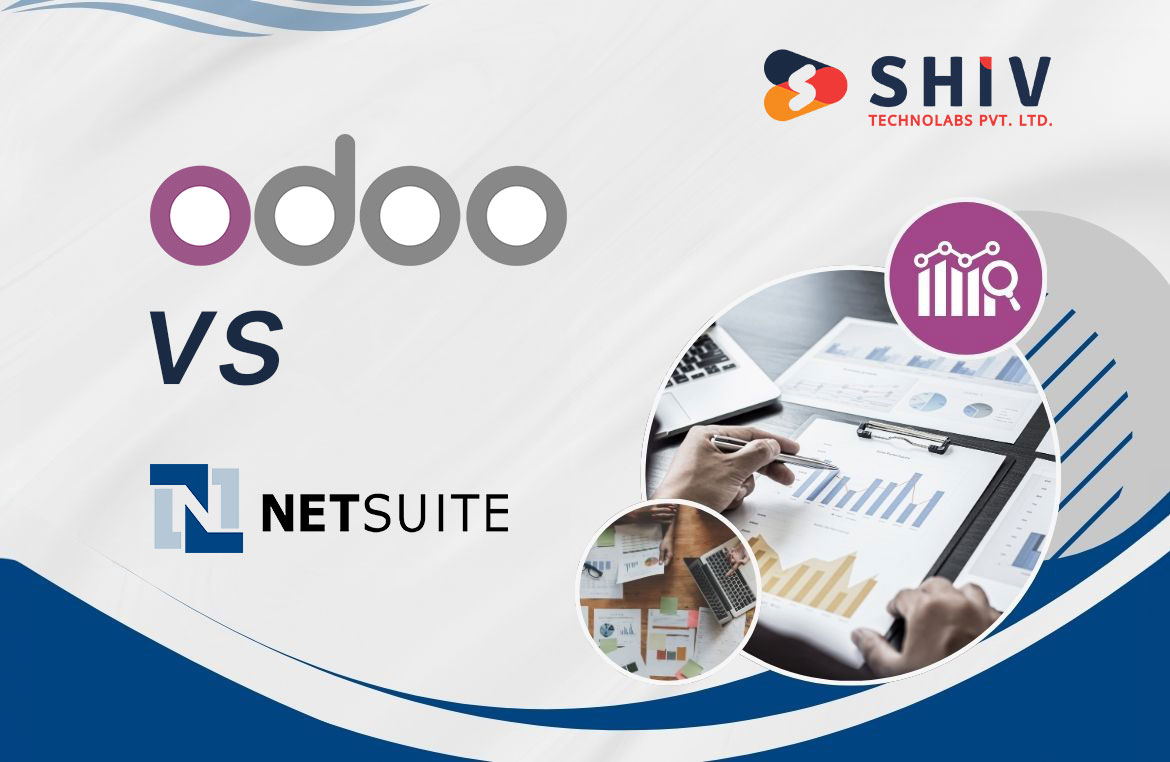Table of Contents
Enterprise Resource Planning (ERP) systems play a key role in helping businesses manage daily operations, improve performance, and gain actionable insights. Among the most popular ERP solutions, Odoo and NetSuite stand out for their strong features and adaptability. Each caters to different business goals and technical needs.
This detailed comparison of Odoo vs NetSuite explains their core strengths, limitations, and major differences. It also highlights how professional Odoo development services can help businesses customize and scale their ERP systems effectively. By the end, you’ll know which ERP platform aligns best with your company’s size, goals, and long-term strategy.
What is NetSuite?

NetSuite is a cloud-based ERP solution developed by Oracle that supports multiple business functions in one platform. It includes tools for financial management, CRM, e-commerce, and inventory tracking, making it a complete system for modern enterprises.
With Odoo vs NetSuite comparisons, NetSuite stands out for its real-time data access and automated workflows. Its cloud structure helps companies manage accounting, sales, and supply chains efficiently. Many growing organizations prefer it for its strong integration and scalability, ensuring smooth business operations across all departments.
NetSuite’s Core Features
NetSuite provides essential ERP modules covering financial management, CRM, e-commerce, and human resources. Its cloud-based system offers real-time data sharing, allowing departments to work together efficiently. When comparing Odoo vs NetSuite, many enterprises value NetSuite for its centralized control and quick access to business insights.
NetSuite’s Target Market
NetSuite mainly serves medium to large organizations that manage multiple operations or branches. It suits growing companies needing advanced scalability, global business management, and powerful analytics. Businesses looking for an enterprise-grade ERP often choose NetSuite for its structured approach to data and workflow control.
NetSuite’s Customization
NetSuite allows custom applications and third-party integrations through its SuiteCloud platform. However, customization can be complex and typically requires expert assistance. Companies often hire certified consultants for tailored setups, ensuring that their ERP aligns with business goals—an important consideration when comparing Odoo vs NetSuite for flexibility and cost.
What is Odoo?
Odoo is an open-source ERP platform known for its flexible and modular design. It offers a complete suite of business tools covering sales, CRM, project management, accounting, and manufacturing. The modular structure allows companies to start with basic features and expand as their business grows, making it ideal for small and medium enterprises.
When comparing Odoo vs NetSuite, Odoo stands out for its affordability, customization options, and user-friendly interface. It gives businesses the freedom to tailor workflows and add modules as needed without heavy costs.
Odoo’s Key Features
Odoo includes modules for accounting, inventory, sales, HR, and project management. Each module integrates smoothly, helping teams maintain accurate records and manage daily tasks efficiently. Its modular structure lets companies choose only the tools they need, improving usability and control while keeping operations simple.
Odoo’s Target Market
Odoo mainly targets small and mid-sized companies seeking a cost-effective ERP with strong customization options. Its open-source model attracts businesses that prefer having full control over their ERP system and the flexibility to adapt it as they grow.
Odoo Customization
Customization is one of Odoo’s strongest points. Companies can modify workflows, reports, and integrations to match their exact business needs. Many organizations invest in Odoo customization services to build scalable and custom ERP solutions. These expert services help businesses align Odoo with their goals, creating a practical and efficient management system that grows with them.
Advantages and Disadvantages of NetSuite and Odoo
When comparing Odoo vs NetSuite, it’s important to understand their pros and cons before deciding which fits your business best. Each system has strengths and limitations that influence usability, cost, and scalability.
NetSuite:
# Advantages of NetSuite:
- Wide Range of Applications:
NetSuite offers modules for financial management, CRM, e-commerce, HR, and inventory control, covering all major business areas. This all-in-one setup helps companies reduce dependency on multiple platforms and maintain consistent data flow. - Strong Integration Capabilities:
It connects smoothly with third-party tools, ensuring reliable data exchange across departments. This is valuable for organizations already using several business applications. - Scalable for Growth:
NetSuite scales easily with expanding operations. Whether for mid-sized or large enterprises, it handles growing data volumes and users without reducing performance. - Real-Time Data Access:
Its cloud structure provides instant access to key business metrics, supporting faster decisions and better coordination among teams. - Advanced Analytics and Reporting:
Built-in analytics help businesses track performance, forecast growth, and make informed choices using detailed reports and dashboards.
# Disadvantages of NetSuite:
- Higher Cost:
NetSuite’s pricing can be costly for small firms. Expenses rise with added users, modules, and customizations, making it a larger investment. - Complex Customization:
Though flexible, NetSuite’s custom features require expert setup. Professional support often increases implementation time and cost. - Steep Learning Curve:
Its wide feature set can be challenging for new users. Companies may need extra training to use the system effectively. - Internet Dependence:
As a cloud ERP, it needs a stable internet connection. Downtime or weak connectivity can limit access to important business data. - Vendor Lock-In:
NetSuite’s proprietary design can make switching systems difficult in the future. Businesses should evaluate long-term commitments before adoption.
Odoo:
# Advantages of Odoo:
- Highly Customizable and Flexible:
Odoo’s modular system lets companies design an ERP setup that matches their exact workflow. This flexibility allows businesses to choose and modify modules based on their unique goals — a strong point when comparing Odoo vs NetSuite. - Cost-Effective:
Odoo is budget-friendly for small and medium businesses. Its community edition is free, while the enterprise version provides advanced tools at an affordable cost, making it one of the most economical ERP options. - Open-Source Platform:
Odoo’s open-source base encourages innovation and community-driven module development. This constant evolution helps improve features, security, and system performance. - Easy Integration:
With its wide API support, Odoo connects easily with third-party tools like accounting, e-commerce, and CRM platforms. This integration ensures smooth data exchange and better process control. - User-Friendly Interface:
Odoo’s simple and clear design allows faster learning and adoption. Employees can manage sales, inventory, and projects without technical complexity.
# Disadvantages of Odoo:
- Limited Out-of-the-Box Features:
Odoo has fewer built-in features than NetSuite, often requiring extra modules or add-ons to meet specific business needs. - Technical Skills Required:
While Odoo’s flexibility is valuable, customization may need expert support. Many companies hire teams offering Odoo development services in the Netherlands to design advanced, reliable solutions. - Dependency on Third-Party Modules:
Some functions depend on external apps or plugins, which may sometimes lead to compatibility issues or additional maintenance. - Maintenance and Support:
Being open-source, Odoo relies largely on community forums for support. Although helpful, it may not always offer quick or professional assistance. - Longer Implementation Time:
Customizing and configuring Odoo takes more time than standardized ERP systems. Businesses should plan for detailed testing and phased deployment to achieve the best results.
Also read : 10 Key Reasons to Invest in Odoo ERP Software
Odoo vs NetSuite Comparison

A detailed comparison of Odoo and NetSuite involves examining several key factors, including features, cost, scalability, and customization options.
# Feature Comparison:
NetSuite offers a more extensive suite of built-in applications, covering almost all aspects of business operations. In contrast, Odoo’s modular approach allows businesses to select and integrate only the necessary modules, which can reduce complexity and cost.
# Cost Comparison:
NetSuite’s subscription model can be expensive, particularly for smaller businesses, with costs escalating based on the number of users and added modules. Odoo, on the other hand, offers a more affordable pricing structure, particularly its community edition which is free. The enterprise version of Odoo provides advanced features at a competitive price.
# Scalability and Flexibility:
NetSuite is designed for scalability and is suitable for large enterprises expecting significant growth. Its robust architecture supports complex and large-scale business operations. Odoo provides flexibility through customization, making it ideal for businesses with unique requirements.
# Customization and Development:
Odoo development is a significant advantage for businesses needing tailored solutions. The open-source nature of Odoo allows for extensive customization, and many companies engage Odoo development services in Netherlands to optimize their ERP systems. NetSuite’s customization, while powerful, requires more specialized knowledge and often professional services, making it potentially more expensive and time-consuming.
Important Factors to Consider When Choosing Between Odoo and NetSuite
When selecting the right ERP system, businesses need to consider various factors to ensure they choose the most suitable solution for their needs.
# Business Size and Needs:
Large enterprises with complex needs might prefer NetSuite for its extensive features and scalability. In contrast, small to medium businesses might benefit more from Odoo’s flexibility and lower cost.
# Budget:
Consider the total cost of ownership, including implementation, customization, and ongoing maintenance. Odoo’s cost-effective nature might be more suitable for businesses with limited budgets, whereas NetSuite’s higher cost might be justified by its extensive features and robust support.
# Customization Requirements:
If your business requires extensive customization, Odoo is a preferable choice due to its open-source nature and the availability of Odoo development services in Netherlands. NetSuite’s customization, while powerful, can be more complex and costly.
# Implementation Timeline:
Evaluate the time and resources required for implementation. NetSuite might offer faster deployment for out-of-the-box features, while Odoo’s customization could extend the timeline. Understanding your business’s capacity for change management is crucial.
# Support and Community:
Both systems offer support options, but Odoo’s open-source community provides additional resources and extensions. NetSuite’s support is more structured through Oracle’s network, providing professional support and services.
Conclusion
Choosing between Odoo and NetSuite depends on your business goals, budget, and level of customization required. Odoo stands out for its flexibility, open-source model, and affordability, making it ideal for small and mid-sized companies seeking control over their ERP system. On the other hand, NetSuite suits larger enterprises that need advanced scalability and built-in tools.
If you’re planning to implement or customize Odoo for your business, Shiv Technolabs offers expert Odoo Development services tailored to your industry. Our team helps you build efficient, scalable, and user-friendly ERP systems that simplify daily operations and support long-term growth. With the right setup, your organization can manage finance, inventory, and customer data in one reliable system.
Get in touch with Shiv Technolabs today to design an ERP solution that fits your business goals perfectly.




















